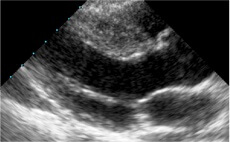Hypertrophic cardiomyopathy is a condition where the heart muscle becomes abnormally thickened. This can results in obstruction to blood flow within the heart and a risk of heart rhythm changes. Hypertrophic cardiomyopathy is a recognised cause of sudden death in young adults.

How common is it?
Hypertrophic cardiomyopathy affects approximately 1 in 500 of the population.
What symptoms might I get?
Many patients have no symptoms but hypertrophic cardiomyopathy can cause symptoms including breathlessness, chest pain and dizziness, usually on exercise. Some patients describe palpitation or blackouts.
What extra tests are required?
Most patients will require additional testing such as an exercise tolerance test or a 24 hour ambulatory ECG monitor. These examine the heart’s response to exercise and checks for abnormal heart rhythms. Some patients require a cardiac MRI to examine the heart in more detail. Genetic tests can help in some cases.
Will I need treatment?
Drug therapy such as betablockers and calcium channel blockers are often prescribed to reduce symptoms. Patients who are perceived to be at a higher risk (e.g. family history of death at young age, abnormal ECG tests), may be offered an implantable cardioverter defibrillator (ICD). Patients with hypertrophic cardiomyopathy are usually advised to avoid competitive sport.
Is it hereditary?
Yes, it is often inherited from either your mother or father but sporadic cases do occur. For this reason we recommend that your parents and any brother, sisters and children you have be screened for the condition.
Does this affect my life expectancy?
Most patients will lead an entirely normal life but hypertrophic cardiomyopathy is a recognised cause of sudden cardiac death.
What happens next?
If you have been diagnosed with hypertrophic cardiomyopathy then an appointment can be made with a local cardiologist to discuss further investigations and treatment options.
Useful links
https://en.wikipedia.org/wiki/Hypertrophic_cardiomyopathy